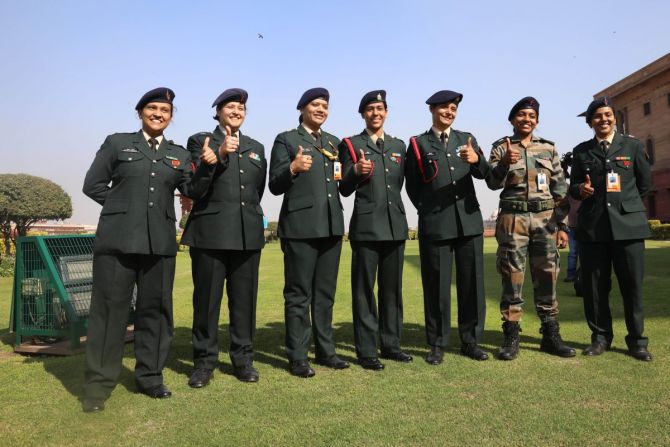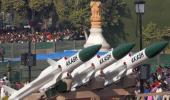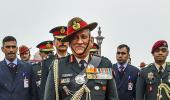20 defence ministry reforms 'is a reflection of the resolve of the government to make the defence sector stronger and more efficient.'
Ajai Shukla reports.

Defence Minister Rajnath Singh released a list of 20 reforms undertaken by the ministry of defence in 2020.
'The booklet is a reflection of the resolve of the government, under the able leadership of Prime Minister Narendra Modi, to make the defence sector stronger and more efficient,' the Raksha Mantri said.
The reforms focused on the PM's Aatmanirbhar Bharat (self-reliant India) initiative, on boosting defence exports, accelerating procurement, strengthening border infrastructure, participation of women in the military, transforming research and development to boost innovation, and assisting in the fight against COVID-19.
Chief of Defence Staff & Department of Military Affairs
Former Indian Army chief, General Bipin Rawat, was appointed India's first Chief of Defence Staff and head of the newly created department of military affairs. The CDS was created to increase coordination between the three services. The DMA was established to improve civil-military integration.
Aatmanirbharta in defence
To promote 'Make in India' in defence, a list of 101 defence items was notified in August 2020, which would be embargoed for import on laid down dates. A second list of 108 items was announced last week.
In addition, the new Defence Acquisition Procedure of 2020 (DAP 2020) was promulgated. Of the capital budget for 2020-2021, Rs 52,000 crore (Rs 520 billion) was earmarked for indigenous defence equipment.
In May 2020, the Ordnance Factory Board was corporatised for greater productivity.
Indigenous weaponry nearing completion included a Quick Reaction Surface to Air Missile and Pinaka rocket launcher, both developed by the Defence R&D Organisation.
Increased defence exports
Defence exports rose from Rs 1,941 crore (Rs 19.41 billion) in 2014-2015 to Rs 9,116 crore (Rs 91.16 billion) in 2019-2020. With exports to more than 84 countries, India now finds mention in the lists of defence equipment exporting nations.
Modernisation and defence acquisitions
Rajnath Singh claimed the 'highest-ever thrust towards modernisation in last 10 years', with the capex budget increasing by 10 per cent in 2020-2021 over the previous year. In fact, the defence allocation for 2020-2021 fell short by 25 per cent (Rs 1.02 trillion) compared to the military's financial projections.
The arrival in India of the first five Rafale fighters in July 2020 and several more since then, added firepower to the Indian Air Force.
Reforming Defence R&D
To promote innovation by young minds, five DRDO Young Scientists Laboratories were launched in 2020 in Bengaluru, Mumbai, Chennai, Kolkata and Hyderabad.
Digital transformation
Several MoD organisations went digital, with the Directorate General Quality Assurance starting online pre-delivery inspection in May 2020. Armed Forces Tribunals began digital hearing of cases in August 2020.
Meanwhile, Defence Estates, Canteen Stores Department, Cantonment services, MoD pension and National Cadet Corps also went online, providing faster and transparent services.
Strengthening border infrastructure
Reforms within the Border Roads Organisation enabled it to achieve targets ahead of schedule.
The Atal tunnel at Rohtang, on the Leh-Manali Highway, was inaugurated by the PM in October 2020. The tunnel provides all-weather connectivity to Ladakh.
Stree Shakti in the military
In 2020, the defence ministry says 'historic decisions' were taken to increase women's participation in the military.
Ten branches of the Indian Army were opened to women officers for Permanent Commission.
The Indian navy operationalised women pilots for the first time.
Sainik Schools were thrown open for girl students from the 2020-21 academic session.
Reforms in NCC
On Independence Day last August, the PM announced expansion of the NCC to remote locations. More than 1,075 schools and colleges in border and coastal areas were identified and the enrolment began in November 2020.
It was also decided to give preference to NCC cadets for enrolment in the Central Armed Police Forces from May 2020.
Aid to combat COVID-19
The three services mobilised maximum resources to aid the government in fighting the pandemic.
The Armed Forces Medical Services provided emergency support, mobilised healthcare professionals and established quarantine facilities across the country.
The DRDO set up hospitals to treat Covid patients, passed on technology expertise to the private sector for manufacturing ventilators, oxygen plants, medicines, test kits and PPE kits.
Help beyond boundaries
To help neighbouring countries, the Navy mounted eight relief missions during 2020-21, providing COVID-19 medicines and doctors to five countries.
Meanwhile, the IAF executed 800 relief missions. Indians stranded in Iran, Sri Lanka and Maldives were evacuated under the Vande Bharat Mission.
- Please click here to read the booklet.












 © 2025
© 2025